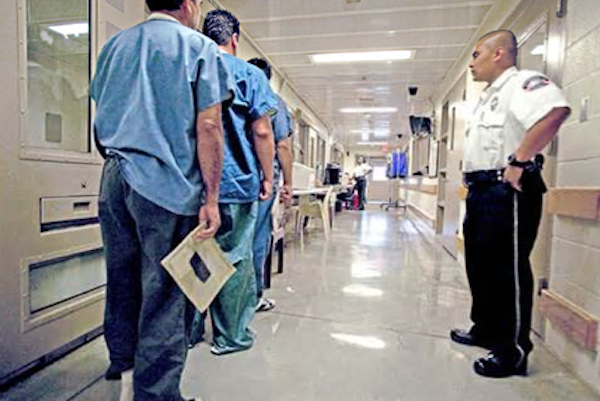
A new report from the ACLU takes a deep look at Criminal Alien Requirement [CAR] prisons—privately run federal prisons designed to house people convicted of breaking immigrations laws. You might be shocked to learn how big of a business this has become. From the report:
Nationwide, more than half of all federal criminal prosecutions initiated in fiscal year 2013 were for unlawfully crossing the border into the United States—an act that has traditionally been treated as a civil offense resulting in deportation, rather than as a criminal act resulting in incarceration in a federal prison. This is dramatically changing who enters the federal prison system. The tipping point came in 2009, when more people entered federal prison for immigration offenses than for violent, weapons, and property offenses combined—and the number has continued to rise each year since.
Thanks to very deliberate choices on the part of our legal system, more immigration violations now end with prison, rather than with deportation. In Texas alone, there are five CAR prisons housing nearly 14,000 inmates convicted of immigration crimes. And there is quite a large and influential set of business interests who would like to keep this system humming along: in the past 25 years, the ACLU says, the private prison industry in America has grown by 1600%. Private prison companies are publicly traded and make up part of the portfolios of countless investors and major financial institutions.
The ACLU’s report details multiple instances of poor conditions in CAR prisons, including poor medical care and lack of basic sanitation. But one of the most disturbing things they catalogue is the tendency of these private prisons to overuse extreme isolation of prisoners in segregated housing units, or SHUs—isolation cells, the extended use of which is regarded in the civilized world as torture. This passage details private prison companies’ insistence on large numbers of isolation cells as a contractual issue:
But our investigation uncovered evidence that the CAR prisons use extreme isolation in ways that are inconsistent with the ABA Standards and [Bureau of Prisons] policy. We heard numerous examples of staff sending prisoners to the SHU for arbitrary reasons that appear to lack any appropriate justification. “Anything you do or say can get you into the SHU,” a Reeves prisoner told us.
Indeed, all of the BOP contracts we reviewed encourage the private prison companies to place excessive numbers of prisoners in isolation. CCA’s contract for Eden, MTC’s contract for Dalby, and GEO Group’s contracts for Reeves and Big Spring each require at least 10% of the “contract beds” to be SHU isolation cells—in effect, setting an arbitrary 10% quota for putting prisoners in extreme isolation whenever the prison is filled to capacity.87 In fact, during the solicitation process for the CAR contract that was ultimately awarded to MTC for Willacy, BOP insisted on a 10% SHU quota even though a potential bidder asked if BOP would consider reducing the SHU requirement “[d]ue to the low security nature of the intended population.”
Whether liberal or conservative, any rational person might wonder why the hell we’re warehousing all of these aspiring immigrants in prison in the first place. And even if we are, we do not need to treat them in a subhuman way. What is this accomplishing?
If you are looking for an industry to target with a divestment campaign, you could not choose a more deserving one than private prisons.
[The full report]














